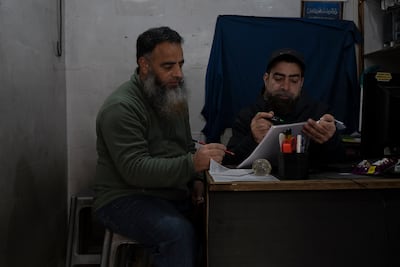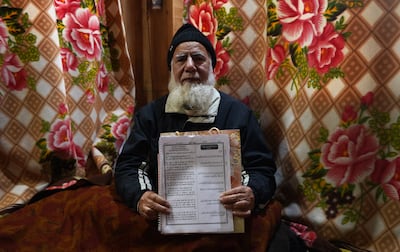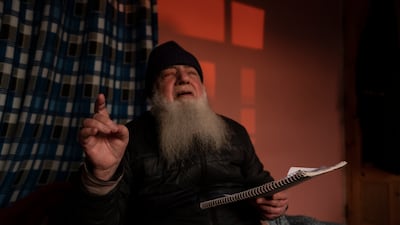Shafi Mohammad Mir rests on a bed placed in a corner of a room in a two-story house in the Rawalpora neighbourhood of Srinagar, on the Indian side of Kashmir.
The room is filled with two tables, on which numerous books, including several copies of the Quran with translations in various languages and dictionaries in Hindi, Urdu and English, are piled on each other.
Mir, born in the Lokhriyar, Nawakadal area of old Srinagar, also known as downtown, was raised in an Islamic environment by his parents. After completing his education he secured a job at Srinagar's Accountants General Office, where he worked for decades alongside people of different faiths and regions.
Twenty years ago, prior to his retirement, one of his non-Muslim colleagues raised concerns regarding the recitation of the 109th chapter of the Quran, titled Al-Kafirun, meaning “The Disbelievers". The chapter contains six verses and rejects the concept of polytheism and reinforces the uncompromising stance of the oneness of God.

“I did not respond to his misunderstandings at that time because I felt that he wouldn’t understand the meaning of those verses without knowing the context of the chapter,” Mir, 88, tells The National.
“Several months later our department organised an event at our office, where various poets presented their works. Being known to have an interest in cultural activities I too was requested to share something with the audience,” he says, adding that the topic was not confined to any particular theme.
“I chose to recite the opening chapter of the Quran, along with its meaning,” Mir says. “I recited the verses of the Quran in Arabic, followed by their Hindi interpretation in poetic form.” During his presentation a member of the Sikh community stood up and praised him, saying that he found “solace in the Hindi poetic translation of Al-Fatiha", the opening of the Quran, which introduces Allah to mankind as most beneficial and compassionate.
Mir’s poetic form of Hindi translation was inspired by bhajans – devotional songs or hymns that often express religious themes and sentiments. He says that he translated the introductory chapter of the Quran in the form of bhajans after the conversation in his office because he felt the format is widely accepted by people in India.
Later, at an event organised by the Islamic Studies Department of the University of Kashmir, Mir recited a chapter of the Quran with its translation in Hindi poetic form in presence of one of the prominent Islamic scholars of India. The scholar was highly impressed by his work and suggested that he should translate the entire Quran in the format, so that more people could benefit from the teachings of Islam in the poetic form.
“Inspired by his suggestion I immediately started working on the last part of the Quran and took me a lot of time to accomplish it,” Mir says. “When I met the same scholar again, he examined my work and he was satisfied with the poetic form of the translation of the last portion of the Quran
“I consider it a miracle because I hail from a place where people don’t have a strong command of Hindi. I acquired proficiency in Hindi during my service. We used to receive some of the official documents in Hindi and the majority of employees struggled with the language,” he says, adding that the government later arranged qualified teachers to train all the employees of the department.

Qaisar Shaifi Mir, his son, says that his father took the references from several books related to Islamic literature, including standard translations of the Quran in Urdu, Hindi and English to ensure accuracy. He says that his father dedicated years to diligently studying Hindi to be able to share the wisdom of the Quran with more of India's 1.4 billion people.
“In November 2023 he completed the task successfully after almost 20 years of dedication and hard work. He wrote each verse manually in notebooks,” Qaisar says. “Throughout these years, despite fluctuations in his health, God has kept him safe and sound, enabling him to fulfil the mission assigned to remove any misunderstandings about Islam among non-Muslims throughout the country.”
Abdul Hamid Mir, Shafi's younger brother, reads the translations to ensure accuracy and authenticity. He oversees the validation process by sending scanned copies of the handwritten verses in the notebooks to various Indian Islamic scholars for examination.

“This process holds significant importance because the subject pertains to the Quran. The context and meaning of the verses in our holy book cannot be altered notwithstanding the fact that in poetic form certain relaxations are accepted. The poetic translation needs to be aligned with the Arabic verses,” Abdul tells The National. “Therefore getting validation from scholars is important prior to the digitisation of the translation.
“The majority of the 30 parts of the Quran translated by my brother are in process of review by some reputed Islamic scholars in India,” he says. “In a couple of months, the remaining sections will also go through the review process.” He says that the digitisation of the Hindi version is currently under way.
Waseen Ahmed Mir, the son of Abdul and the nephew of Shafi, tells The National that the printed version will be produced in a widely accepted format; Arabic verses on the right side and Hindi phrases on the left side, on the same page.
“Once the entire digitisation is complete the printing will be undertaken,” he says. “A couple of parts of the Quran, along with the translation, have been printed for our own reference.”
Expressing his gratitude to all his friends, religious scholars and family members, Shafi says that they have all contributed in their own capacity.
“Digitisation, evaluation and printing are the responsibility of the family members and they all are doing well,” he says of the family's collaborative effort.

